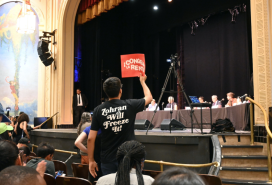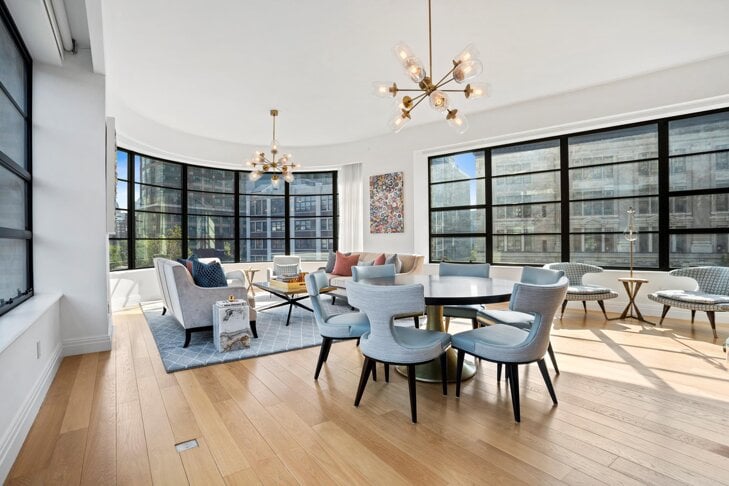8 ways to negotiate a smaller rent increase at lease renewal time
- Smaller landlords may be more flexible than larger, corporate-run buildings
- Gathering intel on what your neighbors pay in rent can help give you an edge
- Ask for upgrades and repairs if you can't push back against a rent increase

The trick to negotiating a rent increase is not to respond emotionally—and to weigh whether staying is cheaper than moving out.
iStock
If your lease is up for renewal, your landlord has likely notified you that your rent is increasing. In New York City's highly competitive rental market, landlords typically try to raise rents for current tenants to match what they could get from new renters.
You may not be an experienced negotiator, but the main tactics to negotiate your rent at lease renewal are not difficult to deploy: Remain polite and point out that you've been a good tenant and paid your rent on time. These are among the crucial considerations to help you get the best renewal deal.
It's important to understand that the market may have changed since you signed your lease. For example, don't expect your landlord to offer another concession—especially in a corporate-managed, amenity-rich rental building, where renewal offers are often non-negotiable.
On the bright side, New York's new Good Cause eviction law gives many market-rate renters the right to challenge a rent increase above 8.82 percent in court. So that gives you a bit more bargaining power in certain situations. Read: "How to tell if your NYC apartment building is protected by the new Good Cause eviction law."
And NYC's new broker fee law may also work in your favor. Landlords now must pay the brokers they hire to market apartments—which may make some more inclined to agree to a renewal on terms favorable to you. Check out: "FARE Act takes effect: What NYC renters need to know about the new broker fee law."
[Editor's note: A previous version of this article was published in March 2025. We are presenting it again as part of our winter Best of Brick week.]
The trick is not to respond emotionally to a significant rent increase and to weigh whether staying is cheaper than moving out. Keep in mind that renewing your lease means you'll avoid the costly hassle of moving to a new apartment, including paying a moving company, a security deposit, and a potential broker's fee.
It also makes sense to renew if you know you'll be in NYC for at least another year and truly love your place.
What if you cannot commit to the lease renewal increase but keep paying your old rent? If the landlord accepts your payments, you become a month-to-month tenant, which can give you some flexibility but not without some risks. Specifically, you no longer have the protection of a lease, and if a landlord wants you out, particularly if you're not paying the requested rent, you face eviction.
Here's what to know if you are negotiating a rent increase during lease renewal.
1. Understand how market-rate units work
As the name indicates, market-rate tenants are subject to the forces of supply and demand. That means when it's time to renew your lease, landlords are free to raise rents—they are only constrained by what renters are willing to pay, with one significant exception: New York's Good Cause eviction law now caps rent increases for some market-rate apartments at 8.82 percent. So it is important to know whether Good Cause applies to your apartment.
Rent increases also depend on demand. If lots of people are looking for a place to rent, landlords are more inclined to raise the rent to match what they could get if the unit was on the market. In slower times, they may be more motivated to offer renewals with small or no rent increases, or even provide an incentive to renew.
In contrast, in rent-stabilized apartments, landlords can only raise the rent by increments approved by the Rent Guidelines Board. That means rent increases for one-year leases starting on or after October 1st, 2025, and before September 30th, 2026, can increase by up to 3 percent. Two-year leases can be increased by up to 4.5 percent.
So while owners may consider a reasonable offer from a good tenant, they also know they may be able to rent the unit out at a higher price to an incoming tenant.

Brick Underground's
Gross Rent Calculator
What's this?
Some New York City landlords offer a free month (or more) at the beginning or end of a lease. The advertised rent is the net effective rent. The net effective rent is less than the amount you will actually have to pay --- known as your gross rent --- during your non-free months.
Brick Underground's Gross Rent Calculator enables you to easily calculate your gross rent, make quick apples-to-apples comparisons between apartments and avoid expensive surprises. All you'll need to figure out your gross rent is 1) the net effective rent, 2) the length of your lease, and 3) how many free months your landlord is offering. [Hint: Bookmark this page for easy reference!]
To learn more about net effective versus gross rents, read What does 'net effective rent' mean?.
If the landlord is offering partial months free, enter it with a decimal point. For example, 6 weeks free rent should be entered as 1.5 months.
2. Point out your history
Landlords generally want to keep tenants in an apartment because finding new renters can be costly, especially if renovations or updates are needed before the place can be put back on the market.
"Some landlords do not want to deal with a lost month of vacancy plus doing any painting, cleaning, and repairs," said Scotty Elyanow, a broker at Compass.
So if you've been a good tenant who always pays your rent on time, make that case to your landlord, who may be less inclined to raise your rent to the level it pushes you out.
Elyanow suggested writing a friendly letter to your managing agent or landlord explaining your spotless track record. You might even appeal to their "better angels," he said, describing how you love your apartment and building and wish to stay for a long time.
3. Stay calm and ask politely
Be respectful when approaching your lease renewal and negotiating against an increase or for a reduction. Don't wait until the last minute.
Tenant attorney Sam Himmelstein, a former partner at Himmelstein McConnell Gribben & Joseph (now retired), advised tenants to say, "I'd like to renew at the same rent," and see how the landlord responds.
Some landlords may not want to negotiate, but many will, Elyanow said. "Keep trying to negotiate with the landlord and know when your deadline is to respond to any final renewal."
4. Do your research
If you're presented with a rent increase, it pays to check what similar-sized apartments are renting for in the neighborhood on real estate listing and brokerage sites. If you are arguing against paying more, it's better to make a case for yourself by presenting some numbers.
Catharine Grad, a tenant attorney at Himmelstein McConnell Gribben & Joseph, said telling your landlord that you've lost your job isn't your best strategy. Think about how you can make the best case for yourself. "Tenants need to figure out what they have to give," she said. That might simply be that you can continue to pay at the same rate.
| How to negotiate a rent increase in a lease renewal | |
|---|---|
| Understand the market and do your research |
|
| Point out your history |
|
| Accept the increase with conditions |
|
5. Get intel from your neighbors
Gramercy renter Jennifer C. found out that her neighbors in a similar-sized apartment were offered an incentive for starting renewal negotiations early and brought it up to her landlord.
"We were not offered that same deal, so I leveraged it," she said. The end result? She negotiated her rent increase down by nearly 50 percent.
This type of bargaining can also occasionally work for rent-stabilized apartments. One renter says he saw a similar apartment in his building going for hundreds of dollars less than his rent-stabilized place. He told the landlord he would apply for the other apartment to save money.
"It went back and forth, and eventually, they conceded and gave me the same lower rate," he said.
Looking for a more affordable rental? Or maybe a landlord who is flexible about guarantors, pets, or "flexing" a space with temporary walls? Put your search into the capable hands of The Agency, a tech-savvy real estate brokerage founded by a pair of Yale grads in response to the frustrating apartment-search experiences of classmates and colleagues. The Agency will charge a broker's fee of 10 percent of a year's rent on open listings instead of the usual 12 to 15 percent if you sign up here. Bonus: The agents at The Agency are a delight to deal with.
6. Small landlords might be more willing to negotiate
Some landlords and management companies, especially those in larger buildings or complexes, use software that sets rental rates according to real-time market conditions, seasonal trends, competitor prices, and other metrics.
However, analytics programs can be expensive for landlords of smaller buildings. A vacancy hurts Mom-and-pop landlords more than a larger rental building, too, meaning their decisions may rely more on a gut check. Even more so if you rent an apartment in a private house: Are you a respectful, quiet tenant who pays the rent on time? If so, they may be more willing to give you a break when your lease is up.
7. Make the case for an upgrade—or repairs
In a slow market, if your rent is going up, you might be able to ask the landlord to make a significant replacement or repair. One renter worked with a landlord who didn't raise the rent one year but wanted to increase it by $150 per month the next. He negotiated it down to $100 and got a bathroom renovation.
"We were willing to pay more to have something a little nicer," he said.
What if you have been asking for repairs to your apartment, to no avail? It's worth mentioning that history when it's time to renew the lease. While bringing up a laundry list of necessary improvements could make for a tense lease-renewal conversation, you could tactfully remind management about any ongoing issues—for example, the elevator renovation that took 12 weeks instead of the scheduled four.
Read "11 things NYC landlords are required to provide, and 11 they’re not that might surprise you" for possible leverage.
8. If the rent is rising, ask for a two-year lease
Asking for a longer lease can lock in the rate and means you avoid going through negotiations again 12 months later. So consider going this route if you like your apartment and are committed to staying in your neighborhood. Not all landlords will be open to giving you a two-year lease, but there's no harm in asking.
—Earlier versions of this article contained reporting and writing by Lucy Cohen Blatter, Donna Airoldi, Nikki Mascali, and Emily Myers.




























